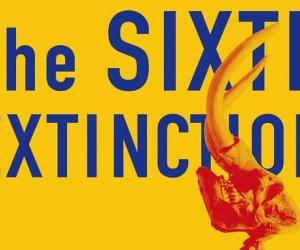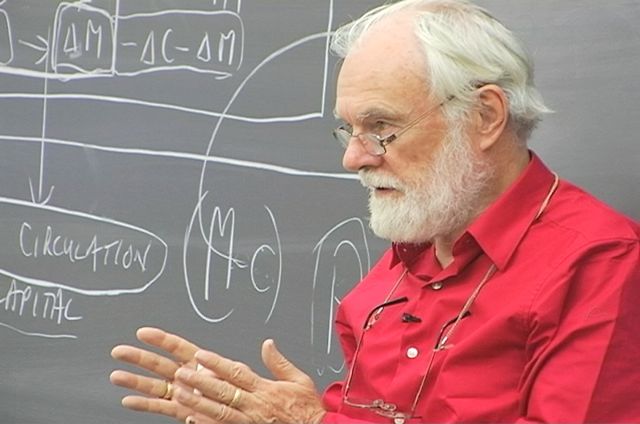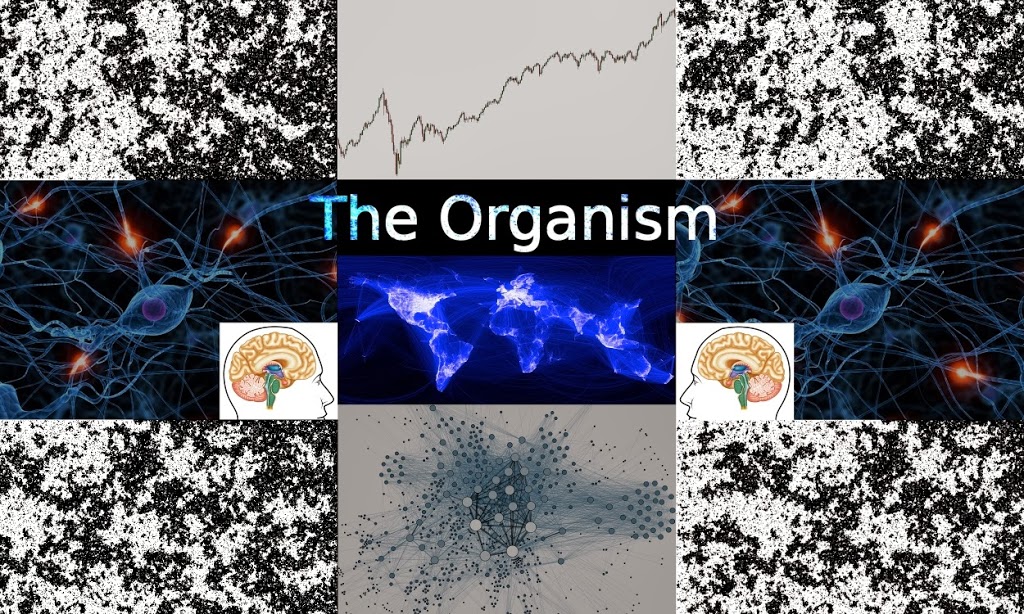Thanks to Ken Olson for allowing me to post his article on my blog. Be sure to visit his site, A Theory of Everything (social). The following was written by Ken Olson on November 5, 2013.
A Megatheory of human destiny
In a previous article I described how history flows in a positive direction over the long term, albeit with periodic and sometimes dramatic setbacks. This sequence of alternating advances (progression) and setbacks (regression) has a specific form of three steps forward and two steps backward, called the Wave Principle.
What propels this pattern of progress? What are the underlying forces that move history inexorably forward toward an ever more progressive future? An answer to these questions would identify no less than the dynamics of human destiny.
Can science inform us about something so seemingly unknowable as human destiny? I believe an answer comes from evidence in the fields of evolutionary biology, psychology, game theory, and socionomics. Core theories from these fields can be combined to create an overarching framework that explains escalating human progress.
These four theories have very different origins. Evolutionary theory derives from Darwin’s observations of biological natural selection, socionomics from observations of stock market prices, motivation theory from research in psychology, and game theory from analyses of game strategies and decision making.
What do these theories share in common? They each reveal dynamics of human behavior that lead to progress and advancement on one hand and regression on the other. Socionomics most clearly shows the path of the future, and the other theories describe how this path is achieved.
OVERVIEW OF THE ANSWER
A fundamental duality exists in the path of human progress in which progress and regress alternate with each other, driven by opposing dynamics. These dynamics are as follows.
PROGRESS: The basis in evolution for advancing waves of progress is natural selection at the level of the group. Group selection provides evolutionary advantages as groups compete with each other. Group selection stimulates positive behaviors such as cooperation, altruism, and selflessness that contribute to the success of the group as a whole. Cooperation is also the central process in several theories of biological and moral evolution, and is the key dynamic in the non-zero-sum logic of game theory. These positive behaviors are characteristic of positive social mood which stimulates waves of human progress. A fundamental motivational orientation of “collective approach” is related to positive social mood and progress.
REGRESS: The evolutionary foundation of declines in human progress is natural selection at the level of the individual, in which individuals compete with each other for advantage within groups. Individual selection promotes negative behaviors such as selfishness and opposition. These behaviors follow zero-sum logic in game theory, and are also associated with negative social mood. The fundamental motivational orientation of “collective avoidance” is related to negative social mood as well as regression and setbacks in human progress.
The human project is ultimately positively skewed because evolutionary group selection, cooperation and altruism, approach motivation, positive social mood, and non-zero-sum game theory logic are the basis of advancing Elliott waves and are stronger and prevail in the long term over individual selection, selfishness and opposition, avoidance motivation, negative social mood, and zero-sum game theory logic which are the basis of declining Elliott waves.
These opposing forces alternate with each other, and the positive, progressive dynamics result in expansion/creation and the negative, regressive forces lead to contraction/destruction. But over the long haul the positive dynamics predominate and insure inexorable progress.
Table 1. FOUNDATIONS OF HUMAN PROGRESS/REGRESS
| OPPOSING DYNAMICS |
PROGRESS |
REGRESS |
| EVOLUTIONARY MECHANISM |
Group Selection |
Individual Selection |
| EVOLUTIONARY STRATEGY |
Cooperation |
Competition/Opposition |
| GAME THEORY LOGIC |
Non-Zero Sum |
Zero Sum |
| PROTOTYPAL BEHAVIOR |
Altruism |
Selfishness |
| SOCIAL MOOD |
Positive |
Negative |
| MOTIVATIONAL ORIENTATION |
Approach |
Avoidance |
The following sections describe the core concepts.
INDIVIDUAL VERSUS GROUP SELECTION IN EVOLUTION
Harvard evolutionary biologist E.O. Wilson has published an important book, The Social Conquest of Earth (2012), about the origins and essential features of human nature. Like his earlier Sociobiology (1975) and On Human Nature (1978), which identified the biological basis of social behavior and started the fields of sociobiology and evolutionary psychology, his recent book has generated strong controversy in his field. And just as the tenets of sociobiology are now widely accepted, Wilson is supremely confident that the principles described in The Social Conquest of Earth are accurate and will inevitably become part of the standard model of human nature.
Evolution produces impulses to survive and reproduce. But the existence of altruism is befuddling in terms of natural selection; why would an individual act in a way that reduces its own chances of survival and reproduction? The reigning theory of kin selection maintains that individuals are willing to sacrifice for other individuals to whom they are genetically related because some portion of their own genetic inheritance will live on in their kin.
Wilson posits a radically new theory that suggests kin selection theory is incorrect. He has published evidence supporting his theory that social evolution is driven by two opposing forces: natural selection at the level of the individual and natural selection at the level of the group.
First, let’s describe individual and group selection. In individual selection, individuals who adapt best to their environment are more likely to survive, reproduce, and pass on their genetic characteristics. Individual selection is based on the relative success of individuals within groups in the competition to survive and reproduce. Group selection, on the other hand, is based on relative success between groups, as behaviors that contribute to the welfare of the group are genetically selected.
Individual selection fosters selfishness, cowardice, deceit, and cheating, which provide an advantage to individuals who compete with others within groups. Group selection, on the other hand, promotes altruism, cooperation, generosity, self sacrifice, and heroism that fosters stronger cohesion and strength of the group as a whole. This gives groups and societies an advantage when competing with other groups and societies. “Within groups,” says Wilson, “the selfish are more likely to succeed. But in competition between groups, groups of altruists are more likely to succeed.” Forming alliances is a good way to win. Groups of cheaters lose to groups of cooperators.
Wilson says that group selection brings about virtue, and although an oversimplification, individual selection creates sin. “An unavoidable and perpetual war exists between honor, virtue, and duty, the products of group selection, on one side, and selfishness, cowardice, and hypocrisy, the products of individual selection, on the other side.” Human nature therefore is the conflicted result of the competing forces of individual and group selection.
Wilson believes that the spectacular success of the human species in relation to other species resulted from group selection that created our remarkable social skills. “By cooperating through the communication and reading of intention, groups accomplish far more than the effort of any one solitary person.”
Maia Szalavitz notes that “Evolutionary theorists have traditionally focused on competition and the ruthlessness of natural selection, but they have failed to consider a critical fact: that humans could not have survived in nature without the charity and social reciprocity of a group.” (Time magazine, October, 8, 2012).
I believe the selfless, cooperative, and altruistic instincts generated by group selection are an evolutionary basis for advancing waves of human progress, whereas the selfish and oppositional instincts molded by individual selection account in large part for declining waves of regression. This conclusion is consistent with other theoretical approaches described in the following sections. Wilson notes that group selection is “the higher level of natural selection…More importantly, group selection is clearly the part responsible for advanced social behavior” and is “the main driving force of evolution.”
COOPERATION
COOPERATION IN BIOLOGICAL EVOLUTION Cooperation is a central dynamic not only in group selection but also in other theories of social and even biological evolution. Evolutionary theory originally stressed competition and conflict. Recent years have seen greater stress on the forces of cooperation and mutual benefit.
Animal and human societies are highly complex, as are living organisms. Increasing complexity itself is what some theorists mean by progress. In the book, The Major Transitions in Evolution, biologists John Maynard Smith and Eors Szathmary examined the major transitions in the history of life and complexity. A cooperative dynamic drove these evolutionary transitions in the successive emergence of genes, chromosomes, cells with nuclei, multicellular and sexually reproducing organisms, and animal and human societies. During each transition, each of these entities became cooperative in order to become part of a larger whole. They exchanged benefits and developed methods to prevent an individual entity from exploiting the others to the detriment of the whole.
Biological cooperation is essential for the existence of life. Cooperation is key to evolutionary progress at all levels of complexity. It is part of our genetic heritage and built into the fabric of life.
Martin Nowak, Harvard professor of biology and mathematics and director of the Program for Evolutionary Dynamics, also stresses the central role of cooperation in evolution in his book, Supercooperators: Altruism, Evolution, and Why We Need Each Other To Succeed. Like E.O. Wilson, he argues that group selection is an important evolutionary process in shaping human behavior: “Many problems that challenge us today can be traced back to a profound tension between what is good and desirable for society as a whole and what is good and desirable for an individual.”
Nowak wrote in Scientific American in July, 2012 that “examples of selfless behavior abound in nature. Cells within an organism coordinate to keep their division in check and avoid causing cancer, worker ants in many species sacrifice their own fecundity to serve their queen and colony, female lions within a pride will suckle one another’s young. And humans help other humans to do everything from obtaining food to finding mates to defending territory…Life is therefore not just a struggle for survival–it is also, one might say, a snuggle for survival.”
Professor of biology and anthropology David Sloan Wilson says humans as a species are “ultra-social, which is jargon for ‘very, very cooperative’…We are designed to be team players in ways that penetrate so deeply into our subconscious that we are only beginning to understand the proximate mechanisms, even though we play them out every moment of our lives.”
Maia Szalavitz points to evidence of cooperation as a critical part of human nature in studies of behavior of children and toddlers as young as 18 months, and in anthropological studies of tribal societies. “Indeed, every such group ever studied has been found to idealize altruism and punish selfishness, in everything from their mythologies to their mating practices.”
COOPERATION IN GAME THEORY In his book Non Zero: The Logic of Human Destiny, Robert Wright discusses the expansion of cooperation in human history. He describes how the evolution of human cultures has led to increasing “non-zero-sumness,” a condition in which two parties both gain if they collaborate. This is the classic win-win situation where there is no loser, as opposed to a zero-sum situation where there must be a loser for each winner, because the interests of the parties are inversely related
Wright argues that the positive direction of history primarily results from the playing of ever more elaborate non-zero-sum games. The interests of various parties increasingly overlap as humankind has developed social structures of increasing complexity that foster greater interdependence. This requires and leads to increasing cooperation, which in turn leads to expanding technological innovation and human progress.
“Organisms and human societies alike grow more complex by mastering cooperation, from Stone Age villages to the World Trade Organization,” says Wright. Non-zero-sum practices lead to economic exchange, trading, currency, and capitalism and their associated technologies. He notes that non-zero-sum logic is also the basis of reciprocal altruism, “a genetically based tendency to form friendships and swap favors with friends.”
COOPERATION IN MORAL EVOLUTION In his book The Expanding Circle, the philosopher Peter Singer describes the dynamics of an expanding circle of altruism and moral concern in human history. Other social animals demonstrate altruism, so there is a biological and evolutionary basis for altruism, and hence ethics. Over time, people’s perspectives have enlarged to value the interests of others. They have widened the range of beings whose interests they value similarly to their own, and have strengthened “the principle of equal consideration of the interests of all.”
Singer notes that group altruism and group loyalty exist, apart from kin altruism. “The circle of altruism has broadened from the family and tribe to the nation and race, and we are beginning to recognize that our obligations extend to all human beings.”
The foregoing analyses share in common the idea that evolution is driven in large part by cooperative and altruistic impulses that over time have increasingly dominated over uncooperative and selfish tendencies. This is the case in biological, cultural, and moral evolution. Furthermore, these cooperative forces impel continuing human progress.
SOCIAL MOOD
Socionomic theory holds that advancing waves of human progress are stimulated by positive social mood, whereas declining waves of regress are forged by negative social mood. The preceding analysis has identified the crucial role of cooperation in evolutionary advancement. In The Wave Principle of Human Social Behavior, these are some of the characteristics identified by Robert Prechter that are associated with the two types of collective mood:
Table 2.
| POSITIVE SOCIAL MOOD |
NEGATIVE SOCIAL MOOD |
| Supportiveness and alignment |
Opposition |
| Concord |
Discord |
| Inclusion |
Exclusion |
| Togetherness |
Separation |
As indicated in table two, cooperative and communal tendencies flow from positive social mood while oppositional traits are associated with negative social mood. The Wave Principle indicates waves of positive social mood dominate relative to waves of negative mood over time (see The Positive Direction of Human Destiny). Therefore we can extrapolate relative predominance of the cooperative and inclusive traits over uncooperative and exclusionary characteristics in the long term. And because cooperation is associated with progress, we may therefore also anticipate continuing long term human advancement.
APPROACH-AVOIDANCE MOTIVATION
Approach-avoidance is a motivational orientation that is fundamental to many forms of animate life. In another article I described how approach-avoidance motivation is related to social mood. Approach motivation is associated with cooperative and positive social mood characteristics of inclusion and togetherness. Avoidance motivation, on the other hand, is associated with negative mood traits such as exclusion and separatism. Approach motivation is also associated with traits such as curiosity and exploration, goal seeking, striving, and achievement orientation, which lead to progress and expansion in social, material, and intellectual realms.
E. O. Wilson states that individual versus group selection “explains the conflicted nature of motivations.” The opposing motivations of approach and avoidance are consistent with the differing social behavior generated by the opposing processes of individual and group selection. Collective approach motivation leads to cooperation as cells, organisms, and people come together, whereas avoidance motivation contributes to separation. Societies embody this tension as they swing over time between collective approach and avoidance tendencies (just as they swing between positive and negative social mood, relative cooperation and opposition, progress and regress).
CONCLUSION
The positive dynamics listed In Table one, of cooperation, altruism, positive social mood, and approach motivation are closely related to each other and are fostered by evolutionary group selection. They are the basis of advancing waves in Elliott wave theory and account for human progress and expansion. The opposing negative dynamics of opposition, selfishness, negative social mood, and avoidance motivation are based in evolutionary individual selection. They are the basis of declining waves that lead to regression and contraction in collective human endeavors.
Biologist Martin Nowak notes the inevitable oscillations between periods of cooperation and selfish defection: “Evolutionary simulations indicate that cooperation is intrinsically unstable; periods of cooperative prosperity inevitably give way to defective doom. And yet the altruistic spirit always seems to rebuild itself; our moral compasses somehow realign. Cycles of cooperation and defection are visible in the ups and downs of human history, the oscillations of political and financial systems.”
Elliott wave theory reveals the pattern of these oscillations and shows that over the long term the advancing waves trump the declining waves. Therefore, the positive dynamics in tables one and two escalate over time relative to the negative dynamics. The result is ever increasing progress in human affairs in the long term, interrupted by periodic decline as the negative dynamics surface. Steven Pinker’s exhaustive study of declining violence over the course of human history is one example of the relative strength of the positive dynamics over the very long term. Despite all the flaws of human nature and the imperfections of the social systems it has created, we can be optimistic about humankind’s long-term destiny and ultimate advancement.










